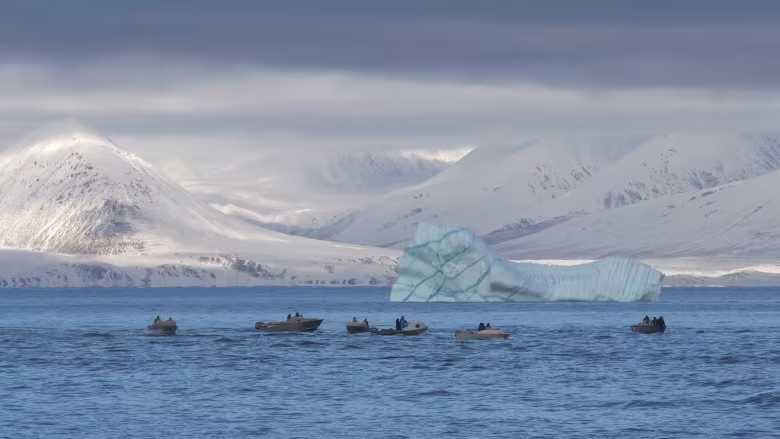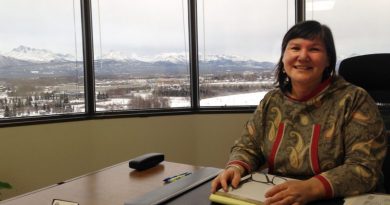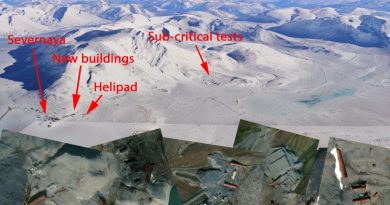Efforts to heal hole in ozone layer also helped Arctic sea ice, study suggests

Without Montreal Protocol, Arctic polar cap would be almost 1 degree warmer by 2050
An international policy struck decades ago is healing a hole in the ozone layer above the Antarctic — but according to a new study, it’s also having an unintended climate benefit on the opposite side of the world.
Climate researchers at Columbia University and the University of Exeter have found the Montreal Protocol — signed in 1987 — is delaying the Arctic’s first ice-free summer by up to 15 years.
Mark England, one of the study’s co-authors, describes it as a “fantastic by-product.”
“The climate benefits are happening today and over the next few decades,” England said.
The Montreal Protocol was a significant international effort that unfolded after the discovery of a hole developing in the ozone layer above Antarctica. Widely considered a great environmental success story, it helped to protect and repair the ozone layer by banning the use of chlorofluorocarbons (CFCs) — a type of greenhouse gas that contributes to ozone depletion.
Before that, CFCs were being used in products like cleaning agents, aerosol sprays and refrigerators.
Earlier this year, the United Nations issued a report saying the hole over Antarctica is slowly but noticeable healing, and should be fully mended in about 43 years.
Lessons to be learned
The peer-reviewed study, published last month in the journal Proceedings of the National Academy of Sciences, used climate models to see what would happen, with and without the Montreal Protocol, in a medium and high emission scenario between 1985 and 2050.
Researchers found that had the protocol not been enacted, the world’s mean surface temperature would be half a degree warmer, and the Arctic polar cap could be almost one degree warmer by 2050.
“By enacting the Montreal Protocol, we were able to delay when the Arctic becomes ice free by somewhere between seven and 15 years, depending on kind of assumptions you make about other emissions,” England said.
He said although policy makers probably weren’t thinking about Arctic sea ice when the protocol was signed, it does carry lessons for changing the course of a warming planet.
“It was such a successful piece of climate mitigation action because it happened so rapidly. Only after a couple years of finding out about the development of the ozone hole, the international community took action,” he said.
“Because these substances last so long in the atmosphere, it’s really key to kind of stop it early,”
England said the policy also “had teeth” because it punished violations of the protocol with trade sanctions.
“It’s useful for these kinds of studies to quantify and document how previous climate action has impacted today’s world.”
When will the Arctic be ice free?
England said one of the study’s limitations is that it only used one type of climate model, and he’d like to confirm the results with other ones.
But he said the main result — that the Montreal Protocol is delaying an ice-free Arctic summer — is “robust” and he expected others would come to the same conclusion.
The study also made some assumptions about what would have happened if the protocol wasn’t enacted, he said, creating a sort of “counterfactual” world that relied on previous approximations of how many CFCs would be emitted.
“It’s very hard to predict the future in those kinds of things.”
It’s also hard to predict when, exactly, the Arctic is going to lose its summer sea ice for the first time. A study published in the journal Nature last week said northern waters could be open for months at a time as early as 2030 even if we drastically scale back greenhouse gas emissions.
That’s about 10 years earlier than previous estimates, said Nathan Gillett, one of that study’s co-authors and a scientist with Environment and Climate Change Canada.
Speaking with Lawrence Nayally, the host of CBC’s Trail’s End, Gillett said his study compared satellite observations of Arctic sea ice trends and climate model simulations and found that on average, the models underestimate the trends.
“When we correct for that underestimation, we get steeper declining trends in the future, and an earlier projected day of an ice-free Arctic,” Gillett said.
England said it’s hard to put a precise year on summer sea ice loss because of random fluctuations in the climate system — like within the atmosphere and in the ocean. But, he said, he believes the main crux of his research “still holds” even if the Arctic becomes ice-free earlier.
He also encouraged vigilance.
Although the Montreal Protocol appears to be successfully repairing the hole in the ozone layer, England said there was an increase in CFC emissions in the atmosphere sometime between 2010 and 2020 — pointing to “fugitive emissions” being emitted despite the international treaty.
Related stories from around the circumpolar world:
Antarctica: Antarctic changes could become tipping points with global implications, says report, Eye on the Arctic
Canada: Arctic could be ice-free as early as 2030s says study, Eye on the Arctic
Greenland: Climate change accelerating ice loss from peripheral glaciers, Eye on the Arctic
Finland: Unusually warm April weather, sunshine records in northern Finland, Eye on the Arctic
Sweden: High risk of wildfires in many parts of Sweden, including North, Radio Sweden
United States: Bering Sea ice at lowest extent in at least 5,500 years, study says, Alaska Public Media



